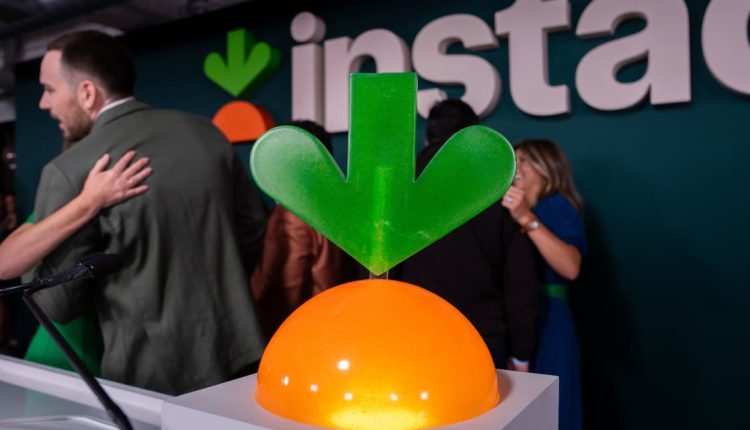As
Instacart
makes a splashy trading debut in New York after an initial public offering valued the grocery delivery platform at $9.9 billion, investors may be curious about its mysterious alter ego, Maplebear.
In its regulatory filings and on Instacart’s website, Maplebear describes itself as a diversified technology business. It says it makes a “proprietary communications and logistics” platform that uses personal shoppers to provide on-demand grocery delivery services in the U.S. and Canada.
The San Francisco-based company, co-founded by Apoorva Mehta, Max Mullen, and Brandon Leonardo, was incorporated as Maplebear in Delaware in 2012. On Tuesday, it began trading as Instacart (ticker: CART) on the Nasdaq.
Shares were up 31% at midafternoon, with a market value of about $10.8 billion.
The company’s name is a combination of “maple,” in reference to Canada, and “bear,” for the logo on the California state flag.
Born in India, Mehta moved to Canada as a teenager. After graduating from the University of Waterloo, he worked at
BlackBerry,
Qualcomm,
and then
Amazon.
com in Seattle. He left in 2010 to move to California to eventually co-found Maplebear.
Mehta has said he came up with the idea for Instacart remembering how much he hated taking the bus to the supermarket in the Canadian winter and having to schlepp home with groceries. He thought of a business where people do the shopping for you and deliver it, instead.
When Mehta applied to Y Combinator, a Silicon Valley accelerator for start-ups, he was initially rejected. “Not wanting to take no for an answer, I sent [Y combinator President and CEO Garry Tan] a 6-pack of beer using our service,” he said on social media. “He immediately grasped the company’s potential and the next day I was invited to interview at @ycombinator.”
It wasn’t until June 2017, when Amazon, the dominant force in online shopping, announced that it was buying Whole Foods that Instacart took off. Whole Foods was Instacart’s biggest customer, so the deal could have been a setback, but grocery stores started reaching out to Mehta, suddenly appreciating Instacart’s ability to help them serve people shopping online.
“Every major grocery retailer in the country was calling us,” Mehta told Forbes magazine. He told Instacart’s then-300 employees it was time for war.
Instacart subsequently signed partnership deals with some of the largest U.S. supermarkets, including
Kroger
and
Costco.
When the Covid-19 pandemic hit, “Everything changed overnight. We saw volume growing at 10% DAY-OVER-DAY, basket sizes were up 50% and everyone’s grandma was in search of a delivery slot,” Mehta said in a social media post about the origins of Instacart.
It is rare for a company to list under a different corporate name, according to Renaissance Capital, which provides research on IPOs and has an IPO index. Recent examples include discount e-commerce marketplace
Wish
(WISH), which went public in 2020 and is also known as ContextLogic Inc., and the 2020 IPO of One Medical, otherwise known as 1Life Healthcare Inc. before Amazon acquired it.
Far more common, of course, are examples where corporate names changed either through mergers or spinoffs of newly-traded entities. One recent example is Johnson & Johnson‘s (JNJ) recent separation of its consumer-product business
Kenvue
(KVUE).
Kellogg
(K) is planning to rename its snack division Kellanova but keep its “K” ticker symbol when it separates its North American cereal business later this year. The cereal business will be called WK Kellogg Co.
Write to Liz Moyer at [email protected] and Janet H. Cho at [email protected]
Read the full article here

